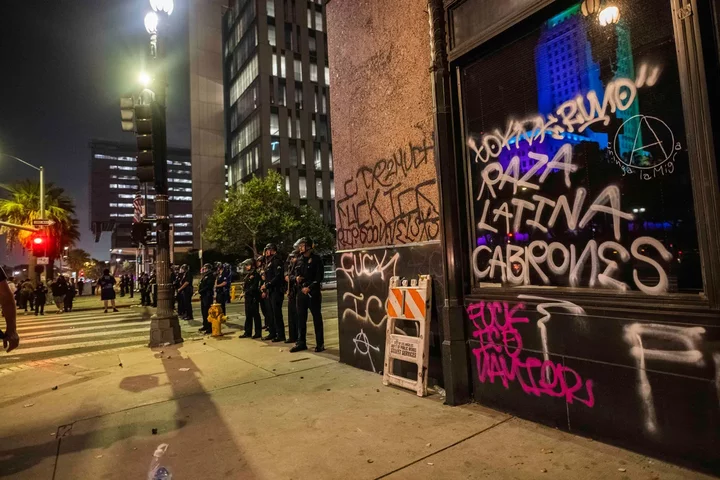Demonstrators protest against ICE immigration raids in downtown Los Angeles on June 8, 2025. Photo by J.W. Hendricks for CalMatters
###
This story was originally published by CalMatters. Sign up for their newsletters.
###
California saw a 3.1% drop in private-sector employment the week immediately after the Trump administration stepped up its immigration raids in the state, according to a new analysis of U.S. Census data.
UC Merced researchers said the steep drop is second only to the unemployment surge the state experienced during the onset of the coronavirus pandemic in 2020, and greater than the immediate decline during the Great Recession in 2007 and 2008.
This appears to be the first analysis of the data from the Census Bureau’s Current Population Survey from the time when federal agents’ focus on the state became clear in early June, when a raid at a garment factory in downtown Los Angeles preceded weeks of sweeps and unrest.
The Census Bureau surveys Americans every month about whether they worked the week before. The UC Merced researchers compared survey results from the week of May 11 to the week of June 8, and found that in California, more citizens than non-citizens reported that they did not work the week after that first raid.
The percentage decline would equate to a loss in California of 271,541 jobs from citizens and 193,428 non-citizens, the report said.
“What we know from previous research is that the work that undocumented immigrants or non-citizens do does not exist in a vacuum,” Edward Flores, lead author of the report, told CalMatters. “If there’s disruptions to the work that undocumented immigrants do, it has ripple effects. A slowdown in one industry could cause slowdowns in other industries.”
That’s consistent with other studies that have shown that mass deportations of undocumented workers reduces job opportunities for U.S.-born workers, and studies that have shown the raids’ negative effects on local economies.
Flores, the faculty director of the UC Merced Community and Labor Center, said he plans to keep tracking and analyzing the Census data and will release similar reports as the federal immigration crackdown continues. He said he expects further escalations of raids because a new federal spending bill substantially increased funding for immigration enforcement.
The effects of the enforcement may continue to be felt more strongly in California. The report also showed that the number of male citizen workers slightly increased in the rest of the U.S. compared with California during the same periods.
White and Latino workers in California were the most affected, the researchers found. The number of Latinos in California who reported work between May and June declined 5.6%, while the number of whites in the state who reported work during the same period decreased 5.3%, according to the report.

The researchers recommended that state policymakers consider “significant action” that may include economic stimulus and disaster relief, similar to what was available during the pandemic.
Flores pointed out that undocumented immigrants lack a financial safety net, such as access to unemployment benefits. As they continue to lose work, that’s not just a problem for them and their families, but for the state.
“When low-income people spend money, they spend it on things they immediately need, which can stimulate the local economy,” he said.
Gov. Gavin Newsom has twice vetoed California lawmakers’ attempts to extend unemployment benefits to undocumented workers. In addition, the state just cut Medi-Cal benefits to undocumented immigrants and froze new enrollments because of budget constraints.
The governor’s office did not immediately return a request for comment.
The California Finance Department closely monitors demographic and economic trends as it shapes state spending. When asked to comment about the UC Merced report, Finance Department spokesperson H.D. Palmer pointed to the “downside risk” mentioned in the state’s most recent economic forecast in the revised May budget. It stated that the Trump administration’s large-scale deportation program could “significantly degrade the state’s labor force.”

CLICK TO MANAGE